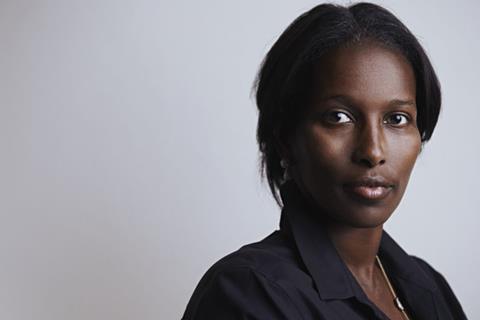Premier Christianity uses cookies Read our cookie policy.
By  Tony Wilson2024-06-14T14:11:00+01:00
Tony Wilson2024-06-14T14:11:00+01:00
The former Muslim turned atheist says she “chooses to believe” the claims of Christianity. Tony Wilson agrees that reason often has a part to play in a journey towards faith. But it isn’t everything.

Source: Aayan Hirsi Ali
In a recent discussion at the Dissident Dialogues festival in New York, Ayaan Hirsi Ali discussed her conversion to Christianity with Richard Dawkins.
During the discussion, Dawkins repeatedly tried to pin Ali down on whether she believed that Jesus was born of a virgin and had really risen from the dead. Eventually, she declared that she chose to believe these things.
Belief implies a level of trust that spills over into all aspects of our live
It didn’t sound like a ringing endorsement for the truths summarised in our historic creeds, but it set me wondering about how we come to believe the things that we do.
Around 35 years ago, I began to assert that Jesus Christ really was the Son of God, that he died to save us from our sins, that he rose from death and ascended to be at God’s right hand where he now intercedes on our behalf.
Did I arrive at my beliefs because I had access to more accurate information than anyone else in history? Clearly not. Many people witnessed Jesus perform miracles and listened to his teaching and yet rejected him. So, belief is not simply a matter of having enough data on which to make a decision.
Perhaps I am just more intelligent than anyone else in history and so I have been able to join the dots in a way that has eluded others. That idea is laughable. Yes, some of the brightest minds in history have found compelling reasons to become Christians, thereby making it an intellectually credible option for anyone to do the same. But countless people alive today and throughout history are way more intellectually gifted and some of them accepted the same beliefs as me and some have rejected them.
So we can set the intellectual arguments aside. This battle has long been fought, with giants falling on both sides, so we need not kid ourselves that we have anything to add.
Since the Enlightenment, our approach to sharing our faith through apologetics is based on making faith plausible in the marketplace of ideas.
But this only takes us so far. I agree with Ali; we each have a choice to make. We can choose to believe what we have received, or we can choose to reject it. The processes around this choice are fascinating.
Belief is not simply a matter of having enough data on which to make a decision
In life, we weigh the beliefs we adopt according to a whole set of criteria that aren’t strictly rational. Do I like the people who have shared their faith with me? Do the lives of people in the faith community make me want to join them? Would adopting the faith put pressure on me to give up something I would rather hold on to? Might it restrict my career options or my political opinions? Could I lose friends or even family? Do I even like the idea that God exists?
We are good at kidding ourselves that we are merely rational beings, making decisions based on facts alone. But the truth may be a lot more subtle. Often, we make post hoc arguments that support the choices that suit us best, or that allow us to adopt the life we prefer. Our gut instincts sometimes have more control over our beliefs than we are prepared to acknowledge.
Christians often place a great weight on making mental assent to theologically correct ideas. And with good reason. As Paul writes in Romans 10:9: “if you confess with your lips that Jesus is Lord and believe in your heart that God raised him from the dead, you will be saved.”
John 3:16 reminds us that whoever believes in Jesus will not perish but have eternal life. The actual Greek word that both authors use conveys so much more than mental agreement; it implies a level of trust that spills over into all aspects of our lives.
Perhaps this is why Jesus is so clear that those who genuinely believe in him are those who actually do the things he commanded us (see Matthew 25, John 14:21).
So Ali is certainly onto something when she says that she “chooses to believe”. There is one more essential dimension to add, however. Our choice might be guided by our reason and informed by a whole range of sociological cost-benefits that influence our thinking. But, more than this, the self-revelation of God himself is critical. Only God can illuminate the soul and prepare a person to believe. God is the first mover in every conversion.
As Christians, how do we help people to choose Jesus? Let’s continue to make the best intellectual case we can. Let’s continue to build winsome communities of love and care that draw people to God. But let’s not forget that the Holy Spirit will blow where he will and that our prayers for family, friends and colleagues are essential. Aayan Hirsi Ali may well have chosen to follow Jesus. But he chose her first!



Don’t Miss Out!
Limited offer: subscribe today and get a free gift of Patrick Regan’s new book Brighter Days!*
Delve into our thought-provoking content from the UK’s leading Christian magazine. Begin your enriching journey with us today.
Tell me more!
*Offer applies in UK only, but check here for our overseas offers
2024-04-30T13:22:00Z By Krish Kandiah
The controversial comedian’s baptism does not change his past or exempt him from facing the consequences of his previous actions, but God only knows the sincerity of his conversion. It is not for Christians to judge, says Krish Kandiah
2024-03-25T14:27:00Z By Kate Orson
Kate Orson speaks to the converts who are leaving the truther and new age movements behind
2024-02-19T15:51:00Z By Stephen McAlpine
The tide is turning on belief in God. There’s a growing interest in the Christian message, says Stephen McAlpine
2024-06-24T11:04:00Z By Andy Robinson
How should Christians who hold a traditional, orthodox view of sexuality and gender engage with Pride month? Andy Robinson says we must consider three things
2024-06-21T10:26:00Z By Leroy Logan
31 years after Stephen Lawrence was brutally murdered, a review has concluded that the four detectives who ran the initial investigation should not face criminal charges. Former Met superintendent Leroy Logan explains why he won’t stop fighting for justice
2024-06-19T16:03:00Z By Mark Arnold
Disabled children are floundering in a broken system, says additional needs campaigner, Mark Arnold. And whoever receives the keys to Downing Street must do something about it immediately
Site powered by Webvision Cloud
source



















Post comments (0)